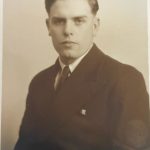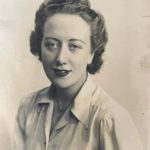Frank Rattley on D-Day 1944
Getting the Job Done
in Frank’s own words
 It was a big job getting the Invasion armada mustered at the integration point, which later became known as “Piccadilly Circus”. It was so ordained that the task of “sheepdog” was allocated to the navy’s little ships. The “light coastal forces’ ‘ craft, Fairmile Motor Launches and Motor gun boats.
It was a big job getting the Invasion armada mustered at the integration point, which later became known as “Piccadilly Circus”. It was so ordained that the task of “sheepdog” was allocated to the navy’s little ships. The “light coastal forces’ ‘ craft, Fairmile Motor Launches and Motor gun boats.
I served as an engine-room mechanic aboard a Fairmile M.L. One hundred feet long, eighteen feet, across the beam and one hundred tons gross. Her high sharp bow and soft-chinned hull, would cut through the water like a knife. She was shallow of draft and sat snugly in the water.
The flotilla in which we served was fitted with special pinpoint navigational equipment and it was our job, assisted by the craft working with us, to get each craft in that flotilla to the right place, at the right time and account for any who couldn’t make it.
A heavy swell was still running from a storm the previous day. Many of the smaller craft were being towed by larger ones. This made “very bad going” for the small craft. As the stern of the larger vessel rose on the swell, so the tow tightened, often with a terrific jerk. If the small craft was going down at the bows, into a wave trough at the same time, the result was far worse. In fact several craft had the pull-rings ripped right out of their bows and were left foundering in the path of the next large vessel in line. Our boats had to nip in quickly and get them clear, take off the men and put the craft down out of the way.
Another incident that I remember was an attack by E-boats. Although shut down in our little world of roaring machinery we were given the buzz of what was going on up-top by the boys in the wheel-house.
Star shells lit-up the ships ahead to our port bow, and we increased speed to investigate. A torpedo struck one of the LCTs (Landing Craft Tanks). We raced ahead, up the aisle between the rows of LCTs. An LCT, to our starboard side, started to cut across our path and had to be made to get back on course a bit rapid.
We learned later that the skipper complained that he was not allowed by us to go to the rescue of his mate. He was told that his job was to “do his job” and let everybody else do theirs.
That to my mind is the simple straight answer to success.
When we arrived at the French coast we had over 40 men on board. We had picked up more survivors than we had crew.
Our job then was to act as a marker for the landings. We were to the left, and a sister ship was to the right, of what would become known as Gold Beach. We had to run in to the sand and throw out grappling anchors, haul back on their lines and drop anchor. At a given time, we had to turn on our stern lights and the approaching landing craft would use them as a port side marker.
And that’s about it really, we just had to sit there. Our job was done, now they had to do theirs.
And they did, for hours, it really was a very, very long day.
Later of course there were the blood runs, back and forth with supplies and fresh blood for the hospital ships. And the Mulberries had to be guided and the old ships that were scuttled to form the breakwater had to be nudged into place by the MLs.
A dignified end for an old ship, I think.
Yes, Just get your job done. Then, on to the next job.
Betty Rattley on D-Day 1944
Everyone Had a Job to Do
in Betty’s own words
 Towards the end of May 1944 (I would have been 19 years old), Frank and I had been married for just two months. He was serving in the Royal Navy and I was doing war work in a munitions Factory in Bournemouth.
Towards the end of May 1944 (I would have been 19 years old), Frank and I had been married for just two months. He was serving in the Royal Navy and I was doing war work in a munitions Factory in Bournemouth.
One day I received a telegram from Frank saying “Come to Falmouth / STOP / Will meet Train STOP”.
Luckily I was able to get time off from work. It was only possible to take the train at 8 pm from Bournemouth, which I did and after five
changes I arrived in Falmouth at 7am. The journey took eleven hours. The trains were packed with men from every service and I heard European accents, Polish, French, etc., and American accents. They were trying to get what rest they could, sleeping on the floor, in the corridors, even in the luggage racks. I sat on my suitcase and managed the best I could.
During the journey the train went through Plymouth. It was a very sad and distressing sight. Gray dusty devastation as far as the eye could see, caused by the bombs. Falmouth was a “Closed Port”. I was met by Frank and the Civil Police. I was told to report to the police station every morning.
Frank was serving on M.L.s, fast motor launches used by the navy for numerous duties. They were well armed and at that time were on convoy duty, fighting off the E. and U. boats that were attacking the convoys that were coming across the Atlantic.
I watched the flotilla of six boats go out every morning, and then counted them back again in the evening, for five days. I then had a visit from the civil police. All unnecessary personnel must leave the port; I was to report to the train station, for the 9 o’clock train the next morning, or risk arrest. At half past eight in the morning they returned, they would escort me to the station. I had to go with them, alone, Frank was to report immediately to his ship.
And that was that.
On the train home, I had the carriage to myself.
Back in Bournemouth. I returned to work at the factory the following day. I worked the night shift 7 pm to 7 am. I used to like to go out onto the east cliff, on my bike, each evening before I went in to work. At about six thirty on this evening, the 5th of June, 1944, in the sea, from the Needles on the Isle of Wight, across to Old Harry Rocks, coming out of Poole and all round Hengistbury Head, as far as the eye
could see, were ships, all sizes, all shapes, all silent, at anchor.
The cliffs were patrolled in those days and I should not have been there.
“HALT! WHO GOES THERE! FRIEND OR FOE.?”
“Friend” I squeaked,
“ADVANCE,FRIEND, AND BE RECOGNISED.”
I crept forward.
“WHAT IS YOUR BUSINESS?”
“I’m on my way to work, night shift…”
“THEN GET ABOUT YOUR BUSINESS AND LET OTHERS DO THEIRS”.
At 1 o’clock, my meal break, I went back on my bike, taking a friend, as our Foreman had insisted. The bay was empty of ships, there was not a sound. This time, the sentry did not challenge us.
After work the next morning I took another look.
Nothing, but the dull sound of heavy far-off guns and planes going overhead. It was the sixth of June, and everyone had a job to do.
